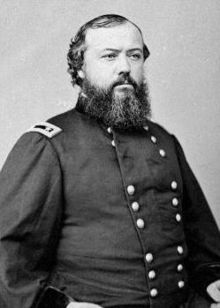Hugh Boyle Ewing
| Hugh Boyle Ewing | |
|---|---|

Maj. Gen. Hugh Ewing
|
|
| Born |
October 31, 1826 Lancaster, Ohio |
| Died | June 30, 1905 (aged 78) Lancaster, Ohio |
| Place of burial | Saint Mary Cemetery, Lancaster, Ohio |
| Allegiance |
United States of America Union |
| Service/branch |
United States Army Union Army |
| Years of service | 1861-1866 |
| Rank |
|
| Commands held |
30th Ohio Infantry Brigade / Kanawha Division Brigade / XV Corps Division / XVI Corps 4th Division / XV Corps |
| Battles/wars |
American Civil War Battle of Philippi Battle of Rich Mountain Battle of Carnifex Ferry Battle of Cheat Mountain Battle of Greenbrier River Battle of South Mountain Battle of Antietam Vicksburg Campaign Battle of Chattanooga Battle of Bentonville |
| Other work | Lawyer, U.S. Minister to Holland, Farmer, Author |
Hugh Boyle Ewing, (October 31, 1826 – June 30, 1905), was a diplomat, author, attorney, and Union Army general during the American Civil War. He was a member of the prestigious Ewing family, son of Thomas Ewing, the eldest brother of Thomas Ewing, Jr. and Charles Ewing, and the foster brother and brother-in-law of William T. Sherman. General Ewing was an ambitious, literate, and erudite officer who held a strong sense of responsibility for the men under his command. He combined his West Point experience with the Civil War system of officer election.
Ewing's wartime service was characterized by several incidents which would have a unique impact on history. In 1861, his political connections helped save the reputation of his brother-in-law, William T. Sherman, who went on to become one of the north's most successful generals. Ewing himself went on to become Sherman's most trusted subordinate. His campaigning eventually led to the near-banishment of Lorenzo Thomas, a high-ranking regular army officer who had intrigued against Sherman. He was present at the Battle of Antietam, where his brigade saved the flank of the Union Army late in the day. During the Vicksburg campaign, Ewing accidentally came across personal correspondence from Confederate President Jefferson F. Davis to former President Franklin Pierce which eventually ruined the reputation of the latter. Ewing was also present in Kentucky during Major General Stephen G. Burbridge's "reign of terror", where he worked to oppose Burbridge's harsh policies against civilians, but was hampered by debilitating rheumatism. He ended the war with an independent command, a sign he held the confidence of his superiors, acting in concert with Sherman to trap Confederate Gen. Joseph E. Johnston in North Carolina.
...
Wikipedia
